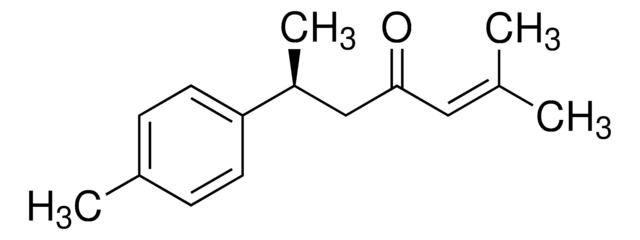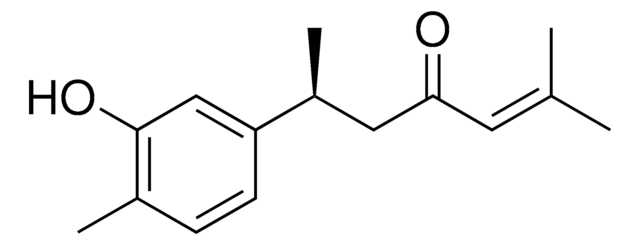42258
(S)-ar-Turmerone
analytical standard
Sinónimos:
(S)-2-Methyl-6-(4-methylphenyl)-2-hepten-4-one
About This Item
Productos recomendados
grado
analytical standard
Ensayo
≥90.0% (GC)
caducidad
limited shelf life, expiry date on the label
técnicas
HPLC: suitable
gas chromatography (GC): suitable
aplicaciones
food and beverages
Formato
neat
temp. de almacenamiento
2-8°C
cadena SMILES
C[C@@H](CC(=O)\C=C(\C)C)c1ccc(C)cc1
InChI
1S/C15H20O/c1-11(2)9-15(16)10-13(4)14-7-5-12(3)6-8-14/h5-9,13H,10H2,1-4H3/t13-/m0/s1
Clave InChI
NAAJVHHFAXWBOK-ZDUSSCGKSA-N
¿Está buscando productos similares? Visita Guía de comparación de productos
Descripción general
Aplicación
Código de clase de almacenamiento
10 - Combustible liquids
Clase de riesgo para el agua (WGK)
WGK 3
Punto de inflamabilidad (°F)
Not applicable
Punto de inflamabilidad (°C)
Not applicable
Elija entre una de las versiones más recientes:
¿Ya tiene este producto?
Encuentre la documentación para los productos que ha comprado recientemente en la Biblioteca de documentos.
Los clientes también vieron
Filtros activos
Nuestro equipo de científicos tiene experiencia en todas las áreas de investigación: Ciencias de la vida, Ciencia de los materiales, Síntesis química, Cromatografía, Analítica y muchas otras.
Póngase en contacto con el Servicio técnico








![[6]-Gingerol ≥98% (HPLC)](/deepweb/assets/sigmaaldrich/product/structures/259/444/6877889c-1cc0-47f5-b807-f847deadec1d/640/6877889c-1cc0-47f5-b807-f847deadec1d.png)


